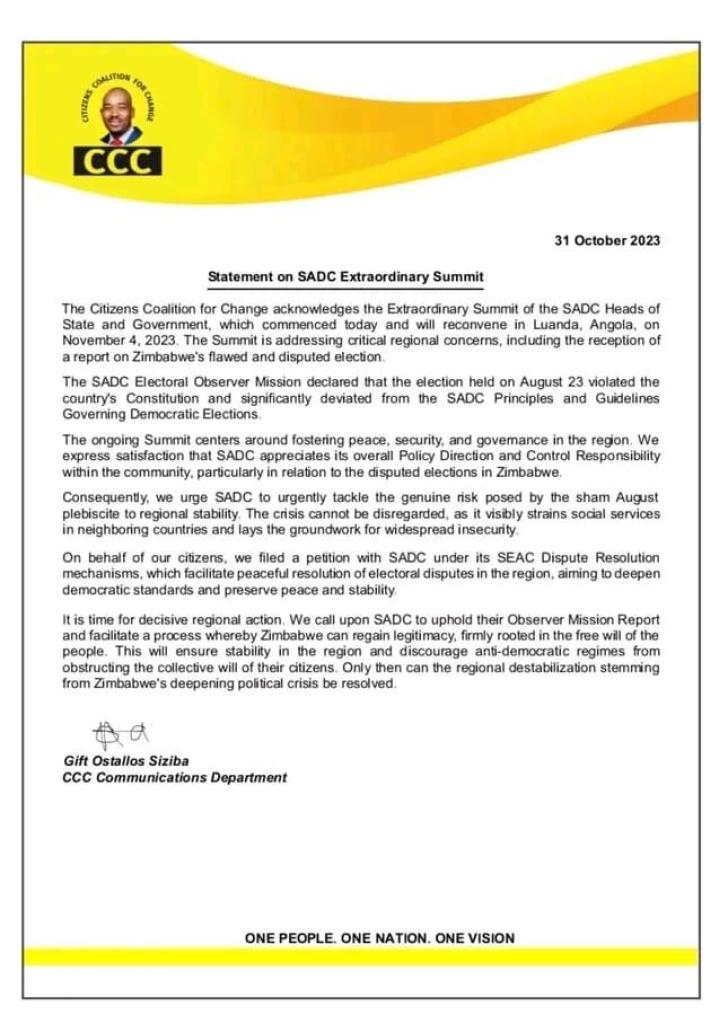News / Local
Chamisa's CCC files petition with Sadc
01 Nov 2023 at 07:30hrs |
1191 Views
Zimbabwe's main opposition CCC says Southern African Development Community (Sadc) leaders should intensify their focus and discussions on the country without fear or favour as its volatile post-election situation poses a clear and present danger to regional peace and stability.
The CCC led by Nelson Chamisa has written to Sadc over Zimbabwe's recent polls complaining about the process and results, saying they were badly flawed and fraudulent.
The Sadc election observer mission said Zimbabwe's elections did not meet basic requirements of the country's constitution, Electoral Act and the regional bloc's principles and guidelines governing democratic elections.
Zimbabwe is a party to the Sadc Treaty - which establishes Sadc itself - and attendant protocols and has obligations to meet.
So it can be held accountable if it breaches those obligations or abdicates its responsibilities.
The Sadc report on Zimbabwe's elections was done by a team led by former Zambian deputy president Nevers Mumba.
It was handed over to Zambian President Hakainde Hichilema in his capacity as Sadc troika of the organ on politics, defence and security cooperation chair.
Zimbabwe's ruling Zanu PF and government officials, assisted by their sympathisers, went on a vilification campaign against Mumba and Hichilema in reaction to the report.
They spewed bile and hurled crude insults like sophomoric activists.
The Zambians' supporters hit back, creating a diplomatic Cold War between Harare and Lusaka by proxy.
Sadc and its officials have openly objected to Harare's insults, saying they are reprehensible and dent the credibility of the organisation.
Hichilema then handed over the report to President Emmerson Mnangagwa who is expected to respond to issues raised.
Sadc now has to discuss the report at the highest level to find a way forward on the issue, something which Mnangagwa is currently objecting to.
Zimbabwe's continued implosion and explosive situation at the heart of the region has serious regional implications and impact of a political and security nature.
Sadc leaders met yesterday for an extraordinary summit of heads of state and government under Angolan President João Lourenço's chairmanship to discusss the regional political and security situation focusing on the Democratic Republic of Congo (DRC) and Zimbabwe. Eswatini also featured.
The Zimbabwean government is angrily objecting to have its recent shambolic and chaotic elections discussed, saying the extraordinary summit must only address the situation in eastern DRC.
Sadc leaders are divided over the issue as shown by their revealing attendance and stayaway from Mnangagwa's inauguration on 4 September.
The Sadc Council of Ministers and the troika of the organ on politics, defence and security cooperation held emergency meetings in Lusaka on 26 and 27 September respectively to deal with DRC and Zimbabwe.
In the process, Eswatini was addressed.
The virtual Sadc main summit, postponed from 25 October to 27 October and then finally 31 October - yesterday, will now reconvene on 4 November physically in Luanda, Angola.
Lourenço is the current Sadc chair and convener.
Sadc sources say the meeting was postponed yesterday due to connectivity problems amid serious debate over Zimbabwe.

The CCC led by Nelson Chamisa has written to Sadc over Zimbabwe's recent polls complaining about the process and results, saying they were badly flawed and fraudulent.
The Sadc election observer mission said Zimbabwe's elections did not meet basic requirements of the country's constitution, Electoral Act and the regional bloc's principles and guidelines governing democratic elections.
Zimbabwe is a party to the Sadc Treaty - which establishes Sadc itself - and attendant protocols and has obligations to meet.
So it can be held accountable if it breaches those obligations or abdicates its responsibilities.
The Sadc report on Zimbabwe's elections was done by a team led by former Zambian deputy president Nevers Mumba.
It was handed over to Zambian President Hakainde Hichilema in his capacity as Sadc troika of the organ on politics, defence and security cooperation chair.
Zimbabwe's ruling Zanu PF and government officials, assisted by their sympathisers, went on a vilification campaign against Mumba and Hichilema in reaction to the report.
They spewed bile and hurled crude insults like sophomoric activists.
The Zambians' supporters hit back, creating a diplomatic Cold War between Harare and Lusaka by proxy.
Sadc and its officials have openly objected to Harare's insults, saying they are reprehensible and dent the credibility of the organisation.
Hichilema then handed over the report to President Emmerson Mnangagwa who is expected to respond to issues raised.
Sadc now has to discuss the report at the highest level to find a way forward on the issue, something which Mnangagwa is currently objecting to.
Zimbabwe's continued implosion and explosive situation at the heart of the region has serious regional implications and impact of a political and security nature.
Sadc leaders met yesterday for an extraordinary summit of heads of state and government under Angolan President João Lourenço's chairmanship to discusss the regional political and security situation focusing on the Democratic Republic of Congo (DRC) and Zimbabwe. Eswatini also featured.
The Zimbabwean government is angrily objecting to have its recent shambolic and chaotic elections discussed, saying the extraordinary summit must only address the situation in eastern DRC.
Sadc leaders are divided over the issue as shown by their revealing attendance and stayaway from Mnangagwa's inauguration on 4 September.
The Sadc Council of Ministers and the troika of the organ on politics, defence and security cooperation held emergency meetings in Lusaka on 26 and 27 September respectively to deal with DRC and Zimbabwe.
In the process, Eswatini was addressed.
The virtual Sadc main summit, postponed from 25 October to 27 October and then finally 31 October - yesterday, will now reconvene on 4 November physically in Luanda, Angola.
Lourenço is the current Sadc chair and convener.
Sadc sources say the meeting was postponed yesterday due to connectivity problems amid serious debate over Zimbabwe.

Source - online
Join the discussion
Loading comments…































